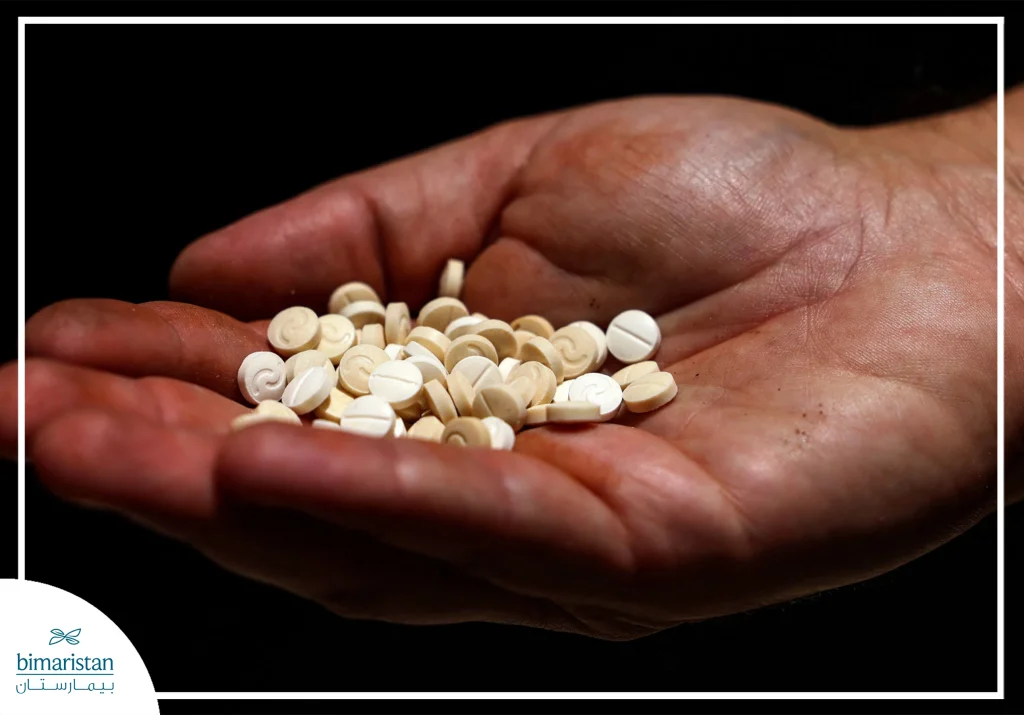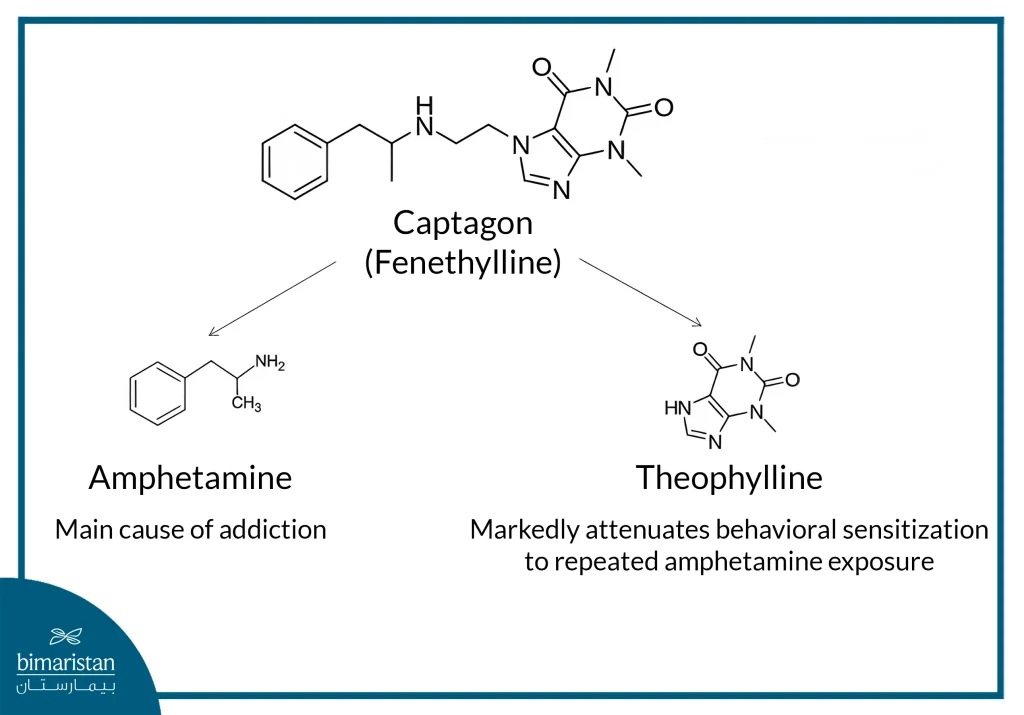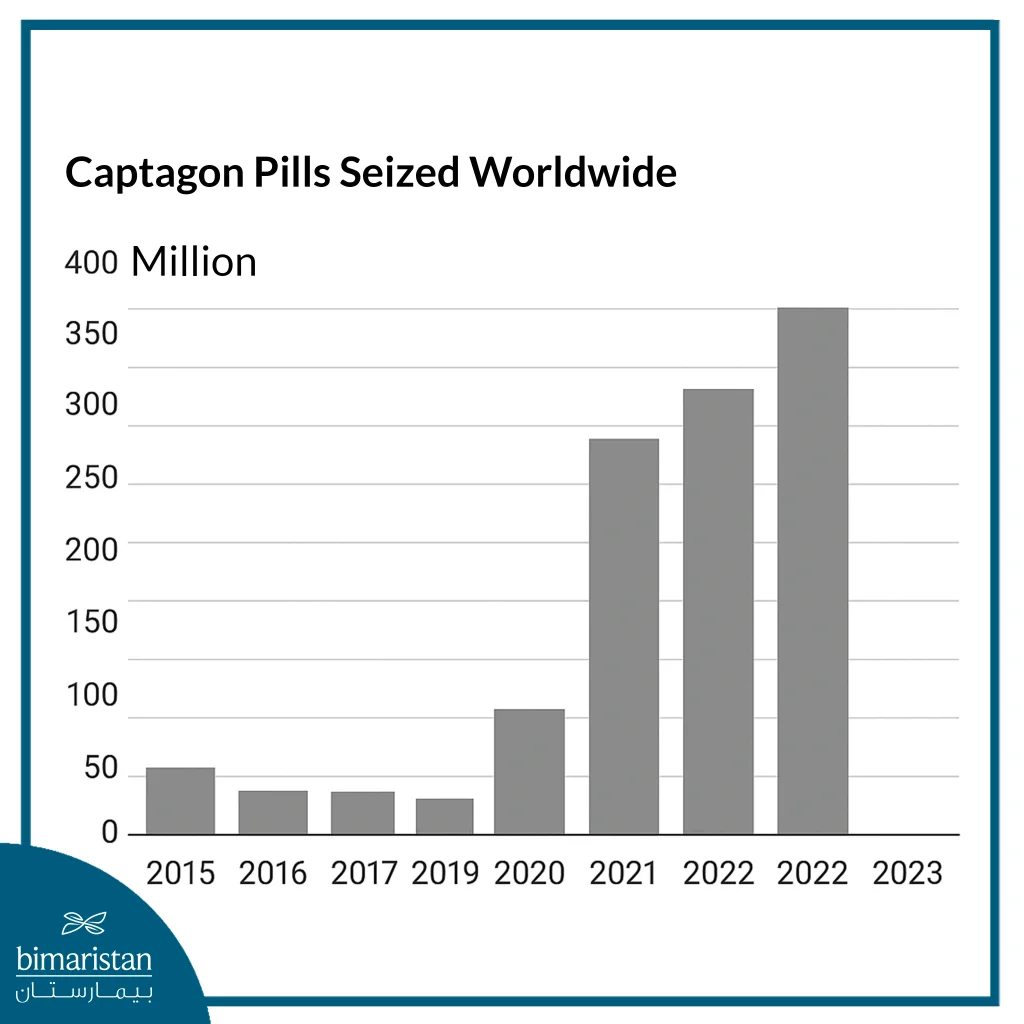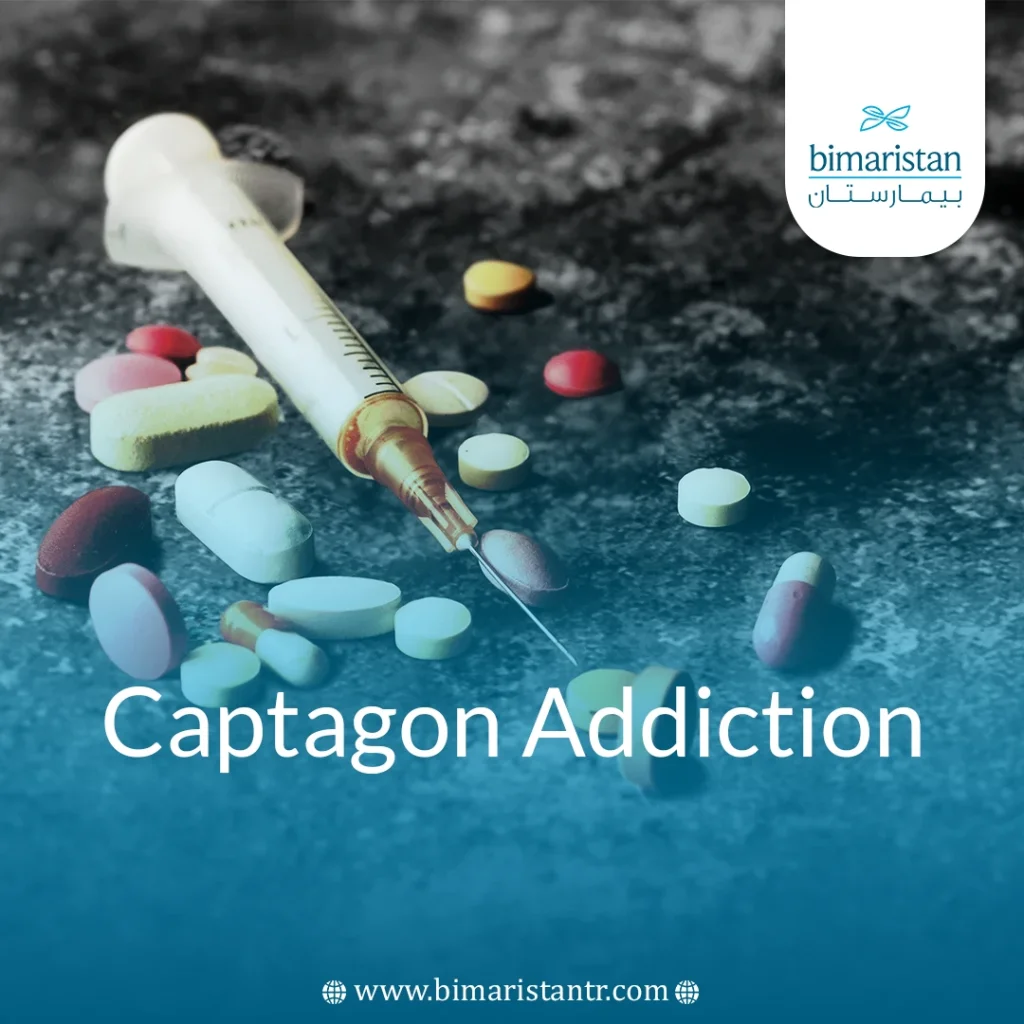Captagon addiction occurs when a person becomes psychologically and physically dependent on the use of this substance and cannot stop using it despite being aware of its harmful effects. It usually starts as an experiment or as a way to increase energy and focus, and gradually develops into full-blown dependence. Reports from the United Nations and drug control centers indicate that captagon addiction has become one of the most abused substances in the Middle East.
In some countries, it is estimated that about 20% to 30% of drug addicts primarily use Captagon. Among young people (18 to 30 years old), the percentage of captagon addiction sometimes reaches about 25% of all drug users, which is a serious indicator of an alarming rise in the spread of captagon addiction, especially among young people.
What is Captagon?
Captagon is the trade name for the synthetic neurostimulant Fenethylline. It was first developed in Germany in 1961 as a treatment for attention deficit hyperactivity disorder (ADHD), obesity, and narcolepsy to improve concentration, reduce hyperactivity, and depression in patients who did not respond to conventional antidepressants. When taking Captagon, the body breaks down phenethylene compounds into two substances: amphetamine, which increases the release of important neurotransmitters such as dopamine and noradrenaline, resulting in a feeling of alertness, vigor, and vitality, providing a sense of well-being and confidence. Theophylline, which helps improve breathing and stimulates the heart, supports physical activity. Thus, Captagon was designed to combine the effects of stimulating the mind and energizing the body.
Despite its initial therapeutic benefits, over time it has been shown that Captagon leads to severe addiction with repeated use, serious side effects on the cardiovascular and nervous systems, and digestive disorders. Because of its significant harms, Captagon has been banned and listed as a controlled substance in the United States and the World Health Organization, which has made it illegal to trade in most countries under the drug control conventions, and the effects of Captagon have become a threat to global security and regional stability.
The Captagon currently on the market is not the original pharmaceutical product, but illegally manufactured tablets that contain a mixture of amphetamine and inferior chemical compounds, or dangerous substances such as excess caffeine, hallucinogens, or even toxic substances. These tablets may resemble the original Captagon, but they are completely different in composition and effect, making them far more dangerous than the original ingredient.

How does Captagon affect the brain and nervous system?
When captagon addiction enters the body, it breaks down into two main substances: Amphetamine and theophylline.
These substances overstimulate the central nervous system.
The main effect occurs at the level of neurotransmitters, the chemicals that transmit signals between brain cells (neurons).
Captagon addiction raises levels of:
- Dopamine: Responsible for feelings of pleasure and happiness.
- Noradrenaline: Which induces a state of “readiness and alertness.”
- Serotonin (to a lesser extent): Regulates mood.
But this artificial state doesn’t last long, and with repeated use of captagon addiction, a profound disruption of the brain’s natural system occurs.
With continued use of captagon addiction, the brain begins to rely on abnormally high levels of neurotransmitters, which leads to the depletion of dopamine and noradrenaline, leaving the addict in a state of severe depression and lethargy once the effect of the drug wears off.
Due to overstimulation by captagon addiction, neurotransmitter receptors are damaged, causing a permanent loss of the ability to feel normal happiness, poor concentration and memory, and deterioration of mental and cognitive abilities.
These symptoms are accompanied by serious psychiatric disorders, such as auditory and visual hallucinations, paranoia, and unprovoked aggressive and violent behavior. In some cases, the symptoms progress to a permanent psychosis that resembles schizophrenia.
Captagon addiction not only affects the brain but also the peripheral nerves.
It causes an increase in the activity of the autonomic (sympathetic) nervous system, resulting in a sharp rise in blood pressure, rapid heartbeat, muscle spasms, limb tremors, and elevated body temperature, sometimes leading to seizures or nervous breakdown.
Captagon addiction forcibly alters brain chemistry, leading to profound and potentially permanent damage to thinking, feelings, behavior, and even vital bodily functions.

The difference between Captagon addiction and recreational use
Recreational use of Captagon differs from addiction in terms of intent, effect, and degree of psychological and physical dependence. Recreational use refers to the intermittent or limited use of Captagon with the aim of achieving a temporary feeling of euphoria, happiness or increased concentration, often on special occasions or under social pressure, at this stage the person may believe that they can control their use without serious consequences, while Captagon addiction is a pathological condition that develops with repeated use, so that the body and mind become completely dependent on the substance.
The addict feels a compulsive need to use Captagon regularly despite knowing the health and psychological harms, and suffers from severe withdrawal symptoms such as severe depression, anxiety, and hallucinations. While the recreational user may go through periods of no use without significant impact, the addict loses the ability to stop, and Captagon begins to completely control their behavior and daily life, leading to serious health, psychological, and social deterioration.
Reasons for the spread of Captagon in the Gulf and Iraq
The spread of Captagon in the Gulf states and Iraq is the result of a complex interplay of factors. Political chaos and armed conflicts, especially after 2011, led to weak border controls and the emergence of organized smuggling networks that use Captagon as a source of funding. Difficult economic conditions and high rates of unemployment among young people have also contributed to pushing some to use or trade the drug. The ease of manufacturing Captagon from cheap raw materials and the possibility of smuggling it through land and sea ports have increased its prevalence significantly.
In addition, the lack of societal awareness of its dangers and the spread of misconceptions, such as considering it a “harmless stimulant,” have encouraged many to use it. Captagon is used professionally among some groups, such as laborers and truck drivers, to endure long working hours without realizing the serious health consequences. In addition, organized promotion targeting specific groups by portraying Captagon as a means of improving performance or mood has made its spread more widespread and dangerous in the region.

Physical and psychological symptoms of Captagon addiction
Captagon addiction leads to many issues and symptoms that affect the mind and body, the most important of which are:
Physical symptoms of Captagon addiction
Symptoms begin with an increased heart rate. With the use of Captagon, excessive stimulation of the autonomic (sympathetic) nervous system occurs, which leads to an abnormally increased heartbeat. The heart rate can reach dangerous levels, putting the person at risk of heart attacks and high blood pressure, as Captagon causes narrowing of the blood vessels, leading to a sharp rise in blood pressure. This constant rise puts a lot of strain on the heart and can lead to complications such as heart failure or stroke, insomniaand sleep disturbances. Due to the stimulant effect of Captagon, addicts have difficulty sleeping (insomnia) for long periods of time. Captagon keeps a person in a hyper-vigilant state, preventing them from getting normal rest.
It also leads to loss of appetite and weight loss, as Captagon causes a sharp decrease in appetite, which leads to significant weight loss. The addict may lose a lot of weight due to not eating regularly, which affects their overall health, excessive sweating, and fever, as Captagon can cause the body temperature to rise abnormally, leading to a boiling sensation, which is very stressful for the body. A common physical effect of Captagon is muscle spasms or tremors in the limbs as a result of overstimulation of the nervous system.
Psychological symptoms of Captagon addiction
The psychological symptoms of Captagon addiction are severe and complex, starting with anxiety and constant stress. The addict may suffer from a disturbed psychological state where he feels constantly alert or suffers from unexplained fear, and severe depression after a period of continuous use, as the addict begins to feel depressed after the drug’s effect is interrupted, the level of dopamine drops dramatically, leading to a feeling of emptiness and extreme sadness. In addition to hallucinations, Captagon can cause auditory and visual hallucinations and headaches, where the addict begins to hear non-existent voices or see unreal things, which are common symptoms in addicts.
Captagon induces paranoia, and the addict often suffers from paranoia, believing that someone is plotting or spying on them, which leads to aggressive or antisocial behavior. The addict also suffers from severe mood swings between states of extreme happiness and extreme violence, causing a deterioration in his social relationships and personal life.
Warning signs of Captagon addiction
Recognizing unhealthy drug use is not easy for families, and it can sometimes be difficult to distinguish between normal mood swings or anxiety in teens and signs of Captagon abuse. Possible signs of a family member’s substance abuse include the following:
- Problems at school or work: He or she may miss school or work frequently, or suddenly lose interest in school or work and fall behind, leading to lower grades or performance at work.
- Excessive irritability, aggressive behavior, and withdrawal: The person begins to show violent reactions to the slightest reasons, may become irritable and aggressive, gradually withdraw from family and social gatherings, and become suddenly tense and unstable in their relationships.
- Problems with health: Lack of energy and motivation, talking abnormally and quickly, and moving around a lot for no apparent reason due to nervous hyperactivity, which leads to poor appetite, followed by body wasting and weight loss.
- Neglect of appearance with obvious physical signs: Becomes uninterested in dress, grooming, or appearance; physical signs such as abnormally dilated pupils, persistent redness, or a vacant look; sweating and overheating without effort; and severe insomnia (one of the most obvious signs) where the person stays awake for a long time without sleep.
- Changes in behavior: Making great efforts to prevent family members from entering the addict’s bedroom or discreetly going out with friends, he begins to feel paranoid and that someone is watching him or following him excessively, and he may hear voices or see things that are not there due to the effect of Captagon on the cognitive centers in the brain.
- Financial troubles: It may start with sudden or persistent requests for money that may include selling personal belongings to secure Captagon doses, stealing money from the house or stealing things, becoming evasive and making up illogical excuses or lies for his or her behavior or absences.
Health risks of Captagon addiction
Captagon addiction can reach people regardless of their age, gender, or economic status, which leads to serious health risks, as Captagon addiction may be more common in some families than others due to genes that increase risk factors, so caution should be taken if a family member is addicted to alcohol or drugs, and may lead to suicide due to mental health disorders that occur due to addiction such as depression, hyperactivity, or post-traumatic stress disorder (PTSD). These health symptoms are caused by painful feelings, such as peer pressure or a severe trauma, such as the death of a parent or spouse, which leads to the use of Captagon as a way to forget these events and issues.
Difficult family circumstances, lack of family ties, or early drug use due to a lack of parental supervision can increase the risk of addiction. This can lead to a loss of control over behavior, and the individual may be exposed to dangerous social or legal situations. Over time, this can lead to nervous exhaustion and complete collapse. The nervous system reaches a state of exhaustion that limits its ability to function properly, leading to constant fatigue, an inability to sleep or concentrate, and hallucinations and severe psychosis similar to schizophrenia.
Compared to other stimulants such as amphetamines and cocaine, the effects of Captagon are longer and more intense. Its combination of amphetamine and theophylline produces a unique euphoria that stimulates the mind and energizes the body. It causes cardiovascular issues, physical fatigue, and a breakdown in the immune system, as continuous consumption leads to a weakening of the immune system, making the addict more vulnerable to infections and chronic diseases. Captagon causes digestive issues as well, from dry mouth, stomach upset, chronic constipation, and may lead to ulcers in the gastrointestinal tract with prolonged addiction.
How to treat Captagon addiction: Effective treatment methods
Treating Captagon addiction requires a comprehensive treatment plan that begins with detoxification and continues with psychotherapy and ongoing support. Keep in mind that success in treatment depends not only on willpower but also on a safe treatment environment, specialized teams, and family and community encouragement.
The first route of treatment begins with detoxification, which means getting rid of the drug in the body. This phase (known as detox) is done in a medical center under the supervision of specialized doctors and includes medical monitoring of the patient to counteract withdrawal symptoms such as anxiety, insomnia, depression, and extreme fatigue. Medications may be used to help alleviate the symptoms.
The second method of treatment is psychological and behavioral therapy. It is divided into six types:
- Cognitive Behavioral Therapy (CBT – Cognitive Behavioral Therapy)
- Motivational Interviewing (Motivational Interviewing – MI)
- Group Therapy
- Family Therapy
- Life Skills Training
- Dialectical Behavior Therapy (DBT – Dialectical Behavior Therapy)
The third way of treatment is through a combination of psychosocial support and rehabilitation programs. Involving the family in the treatment program increases the chances of recovery because they are a source of strength and support for the patient, while training the family to deal with the patient after treatment to prevent relapse. Rehabilitation programs include vocational training, improving social life, and the goal is to reintegrate the recovering person back into society and return to their previous life or start a new one. We mention that regular care and follow-up prevent relapse after the end of the treatment program, which includes periodic examinations, support sessions, and psychological assessments to ensure continued recovery.
Behavioral treatment programs for Captagon addiction
Behavioral treatment programs for Captagon addiction are one of the most important foundations for successful recovery, because they not only stop the use of the drug but also address the psychological and behavioral aspects that led to addiction and help the patient avoid relapse:
Cognitive Behavioral Therapy
It is a therapeutic approach that aims to change the negative thoughts and harmful behaviors associated with drug use, and helps patients identify the triggers that lead them to use Captagon and learn skills to control them. This treatment is applied through individual sessions with a therapist in which they discuss the situations that led to the attempt to use, analyzing that moment and the user’s way of thinking. This treatment is one of the most successful methods of relapse prevention and is especially useful for those with anxiety, depression, or ADHD.
Motivational Interviewing
It is a therapeutic method that aims to strengthen the patient’s motivation to change and quit addiction through dialogue and moral support. This therapy is applied by asking questions and providing reflections, which helps the patient discover their inner desire to stop using. It is effectively used in the early stages of treatment to motivate reluctant patients.
Group Therapy
It is a group of sessions in which several patients participate under the supervision of a specialized therapist. It is characterized by the ability to end the patient’s loneliness and make them feel that they are not alone in their suffering, reduce the sense of guilt resulting from addiction, and provide opportunities for recovery. This therapy is characterized by its ability to end the loneliness of the patient and make them feel that they are not alone, minimize the guilt of addiction, and provide opportunities to learn from each other’s stories and mutual encouragement.
Family Therapy
It is a group of sessions in which family members participate to address the tension or family conflict caused by addiction, teaching them how to deal with the recovering person in a healthy way, and supporting them psychologically because they are an essential part of the recovery plan.
Life Skills Training
It is a program that aims to rebuild a person’s ability to manage time, make healthy decisions, and deal with stress without resorting to drugs.
Dialectical Behavior Therapy
A program used for those with severe emotional fluctuations or suicidal tendencies, it teaches a person how to control emotions, regulate their emotions, and improve their relationships.
Challenges addicts face during Captagon addiction treatment
People addicted to Captagon face significant challenges during treatment, often starting with severe withdrawal symptoms such as depression, anxiety, insomnia, and extreme fatigue, as well as a strong desire to return to using. These symptoms need careful medical supervision, especially in the early stages of treatment. The psychological desire to use is one of the most serious challenges, as the addictive memory remains active even after stopping, making the person vulnerable to relapse when faced with psychological pressure or seeing triggers associated with drug use, such as certain places or old companions. Social stigma further complicates the situation, as the recovering person may feel ashamed or rejected, which weakens their self-confidence and reduces the chances of sticking to treatment.
On the other hand, the lack of family support is a negative factor in recovery, especially when parents treat the patient with suspicion or harshness instead of providing a supportive and safe environment. Also, many recovering patients neglect aftercare, believing that treatment ends when they leave the center, although psychological follow-up is essential to prevent relapse. Recovery is more difficult when the patient suffers from comorbid mental disorders such as anxiety or depression, or faces life stressors such as unemployment or legal issues. These are all factors that increase the chances of Captagon addiction and relapse.
The importance of detox in Captagon addiction treatment
The detox phase plays a crucial role in the treatment of Captagon addiction, as it is the first and essential step to start the physical and psychological recovery process. This phase aims to cleanse the body of the narcotic substance safely and under specialized medical supervision in order to alleviate withdrawal, which can be severe or dangerous.
The importance of detox is not only limited to the physical aspect, but it also paves the way for psychological and behavioral treatment later, because the drug’s remaining in the body hinders the effective response to treatment and increases the risk of relapse. This stage also allows doctors to assess the patient’s general health condition and provide appropriate pharmacological and psychological support to help him pass the critical stage with the least possible pain.
Family and social support plays a pivotal role in the treatment of Captagon addiction, as it is as important as medical and psychological treatment. An understanding family can provide a supportive place for the addict to feel safe and secure, which can help them feel encouraged, stay on track with their treatment plan and recover. A supportive family can be the first line of defense against relapse through constant monitoring and treatment.
As for the social aspect, it is based on integrating the recovering person into a supportive environment, whether by providing a group support program or healthy social activities, reducing the state of loneliness resulting from Captagon addiction, preventing the return of addicts to environments of abuse, and the presence of friends or mentors helps reduce daily psychological pressure, and gives the recovering person tools to cope with life without returning to the drug.
How can a family provide support for a Captagon addict?
The family is one of the main pillars in the treatment of Captagon addiction, if they provide effective support based on understanding and awareness of the dangers of Captagon and its addiction. The family must understand that Captagon addiction is a complex psychological and behavioral disease, not just weakness of will and weakness, and their awareness of the nature of addiction changes their perception of the addict, preventing negative reactions such as scolding or exclusion. Encouraging the patient’s family to seek treatment without coercion in supportive, non-threatening language can positively drive towards treatment and recovery, reinforcing the patient’s commitment to treating Captagon addiction.
The family should follow up and gently monitor progress. Follow-up does not mean spying or disturbing the recovering person, but rather paying attention to any signs of relapse while providing treatment in a calm manner. Support does not end when the patient leaves the treatment center, as the symptoms of Captagon addiction can reappear, so the recovering person needs constant encouragement to attend sessions and practice new hobbies. Finally, the family must accept that relapse is possible, and relapse does not mean the failure of Captagon addiction treatment; it is a standard part of the recovery journey, and an informed family can respond with support and guidance, not blame or discouragement.
Recovering from Captagon addiction: Steps and triggers
Recovering from Captagon addiction is a gradual process that requires time and effort, and is based on basic steps with triggers that help the addict regain his or her life. This starts with recognizing the issue and the earnest desire to change. Only by recognizing the existence of Captagon addiction, and feeling a sincere desire to change and get rid of its symptoms and harms, can one get rid of Captagon addiction. After recognizing the issue, the patient must undergo a psychological and physical medical evaluation to determine the treatment plan. After the assessment, the detoxification phase begins, followed by psycho-behavioral therapy, family and social therapy, rehabilitation, and aftercare to prevent relapse.
There are many motivators that support the process of treating Captagon addiction, namely having strong family support and achieving small, incremental goals such as avoiding use for a week or maintaining consistent attendance at school or work. Having a strong religious and spiritual faith can be a great source of psychological strength, and integrating into a supportive community environment while moving away from the old environment of abuse. These are all health-improving and self-confidence-boosting catalysts for treating Captagon addiction that lead to a comprehensive lifestyle transformation.
Captagon addiction is a complex health and psychological challenge that affects not only the individual, but also the family and society as a whole. This drug, which is initially a recreational product, can quickly turn into a destructive addiction due to its profound effect on the nervous system. Its increasing prevalence in the Middle East has called for the need to raise awareness of the dangers of captagon addiction, and the importance of early detection by observing physical and psychological signs and symptoms. Prevention and awareness are the first line of defense against captagon addiction.
But if addiction occurs, comprehensive treatment that includes detoxification, psychotherapy, and social support is the path towards recovery. Despite the challenges, family support and behavioral programs enable the recovering person to regain their life, as recovery is not only stopping use, but building a healthy and balanced life that prevents relapse and re-use.
Sources:
- SA Health. (n.d.). Amphetamine withdrawal management. Government of South Australia
- Hokayem, E. (2024, April 24). The Captagon problem in Saudi Arabia and other Gulf states. Arab Center, Washington DC
- Wasti, S. A., Zahid, M. F., Farooq, S., & Zubair, M. (2024). Captagon crisis in the Middle East: An emerging public health burden. Cureus, 16(1), e51567
